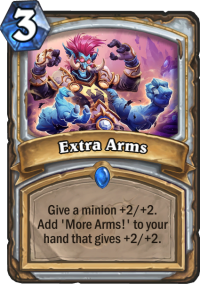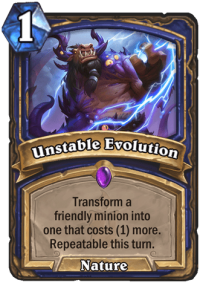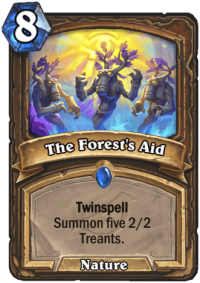One of Rise of Shadows’ new keywords is Twinspell, a resource-generating mechanic where the spell adds another copy of itself to your hand (without the keyword) upon casting. This is a different and much healthier-looking version of new-school Hearthstone control tools than the ones we’ve seen before, crucially allowing the opponent to plan accordingly based on the information provided by the Twinspell itself.
Echoes of the Past
Like we’ve seen so many times before, the new keywords of the upcoming Hearthstone expansion owe a lot to effects we’ve previously seen in the game. While the immediate comparison that comes to one’s with Twinspell would be Echo, a more specific prelude would be Priest’s Extra Arms spell, which is functionally identical to it (down to the point where the “bonus” spell is similar but not the exact same in card text).

Still, Echo (itself an expanded-upon version of Unstable Evolution) forms a good basis of discussion from a design perspective. Not many of those cards ended up seeing competitive play (not counting the aforementioned Shaman spell, only Phantom Militia found a niche role in Quest Warrior), simply because the mechanic is so difficult to get right from a value perspective. Offer too much for a single use and you risk making it omnipresent – make its base cost too high and it won’t be worth playing. Team 5, as usual, erred on the side of caution with the keyword, printing cards that were mostly not good enough for Constructed play. A notable exception to this would be Warpath, a clearly excellent card hamstrung by the popularity of Odd Warrior. It’s also worth keeping in mind that most Echo cards are top-tier draft options in Arena, as the flexibility combined with the potential high value of a single card is worth a lot in that particular format.
So what makes Twinspell different? For starters, the potential range of pricing is different – no Echo card costs more than three in the game and it’s logically impossible to print one that costs more than five –, providing design space for potentially more powerful effects. It also lends itself well to both tempo and value-based cards as the cap of the single “extra” usage also allows Team 5 to up the stats on a Twinspell compared with an Echo card.

One has to wonder what kind of hand disruption tools we’ll get in Rise of Shadows – something the developers have all but confirmed in different community interviews –: many of the unveiled mechanics feel like a spell-based Dirty Rat of sorts will potentially be required to keep them in check. (The change to the Specialist format in competitive Hearthstone also sees to foreshadow the arrival of different viable tech cards in the Year of the Dragon.) If strong counterplay tools exist, the manageable strength level of Twinspell cards will be even higher in the Standard format. We also don’t yet know whether Twinspell-related synergy cards will exist in the class-specific or neutral category: while Mistwraith was a dud, a Mechwarper-esque cost reduction effect or some other strong synergy can propel the cards with the keyword to the top of the strength charts.
Keep in mind you aren’t required to use the second spell on the same turn, further increasing the potential utility of these cards. In fact, this is what makes the keyword comparable with Magic’s “Flashback”, a keyword that allowed you to re-cast a card from your graveyard for a specified cost. Of course, there are minor functional differences: the bonus card from the Twinspell will take up a slot in your hand, is “flashback” requirement has to be identical to the original spell’s mana cost and it’s limited to spells. Some Flashback cards, like Cabal Therapy and Call of the Herd, ended up as tournament staples – it remains to be seen whether the same will happen to Twinspell. The potential is certainly there – the question is how conservative Team 5 was with a keyword with many positive gameplay implications.
Hand in Hand
One of the major criticism about competitively viable cards with a wide range of potential resource generation outcomes (from Unstable Portal to Primordial Glyph among a plethora of other such tools) was the fact that the opponent had absolutely no counterplay opportunities: the issue is not necessarily the premium card that was added to your opponent’s hand but the notion that you were always going to play into it due to a lack of reads, something which is impossible to make when the pool of outcomes includes all class-specific spells or every minion in the game. Of course, cards like these meshed very well with the previous design leaders’ philosophy of increasing the range of potential gameplay states in a matchup to make sure they don’t turn stale – however, the understandable downside of this was the constant increase in variance. An oft-suggested solution to this was to reveal the generated card to both players – in a way, this is exactly what Twinspell does. Two cards for the price of one is a potentially excellent deal for slower mirror matches and the fact that your opponent knows you have yet another copy of the same effect on tap can create really interesting decision points.

While The Forest’s Aid seems like an underwhelming card at first because of the price, an underappreciated part of the spell is that it immediately forces your opponent into producing two board clears over the course of two turns if you include it in a burst-based token archetype, likely the only logical hope of this kind of a card in Constructed. We’ve seen how little board presence a deck like this requires to finish off its opponent; it could be just the coup de grace to win out the game, much like the n-th Soul of the Forest-based board would in previous iterations.
It’s the sort of card that can’t really survive the face-level scrutiny but the potential synergies give it much more potential than it’s currently credited for by most of the community – and it feels like the foundations of Twinspell seem to indicate most of the cards featuring the keyword will be of a similar ilk. It may be underwhelming and derivative on the surface, but this could be the very fact that makes it a more meaningful inclusion than Echo was.

[…] Article: Double Trouble – The Dynamics of Twinspell […]
To talk about Forests Aid. If this wouldnt be a Twinspell, its really expensive. But 5 2/2 are still a threat. And you can cast it next turn again. I would prefer to spend 8 mana for Whispering Wood into Soul of the Forest. But i think this is not for TokenDruid. Maybe there is an archetype “TreantDruid”. So many synergies already with Mulchmunder, Treespeaker, Gloomsprayer. And Mulchmunder also a mech to get targeted by Ziliax.
The enemy needs a lot of removal to deal with 10 treants. Losing Spreading Plague and the ramp got nerfed maybe its hard to reach that turn 8. Cause its really risky to play this that late. Until you not busy surviving, maybe having a little Advantage at this state of the game, you might able to play it.
Twinspell will getting more interesting when the spell costs 5 or less.
It seems to me that the classes defending Dalaran will get those Twinspells. But iam not that sure about that.